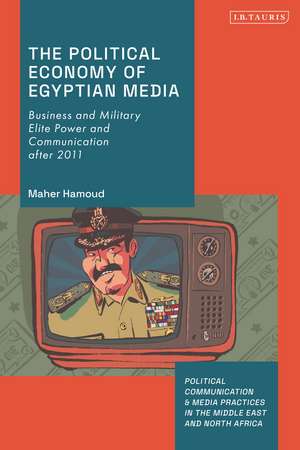The Political Economy of Egyptian Media: Business and Military Elite Power and Communication after 2011: Political Communication and Media Practices in the Middle East and North Africa
Autor Maher Hamouden Limba Engleză Hardback – 28 iun 2023
Preț: 510.42 lei
Preț vechi: 731.21 lei
-30% Nou
Puncte Express: 766
Preț estimativ în valută:
97.70€ • 106.16$ • 82.12£
97.70€ • 106.16$ • 82.12£
Carte tipărită la comandă
Livrare economică 21 aprilie-05 mai
Preluare comenzi: 021 569.72.76
Specificații
ISBN-13: 9780755643073
ISBN-10: 0755643070
Pagini: 232
Dimensiuni: 156 x 234 mm
Greutate: 0.5 kg
Editura: Bloomsbury Publishing
Colecția I.B.Tauris
Seria Political Communication and Media Practices in the Middle East and North Africa
Locul publicării:London, United Kingdom
ISBN-10: 0755643070
Pagini: 232
Dimensiuni: 156 x 234 mm
Greutate: 0.5 kg
Editura: Bloomsbury Publishing
Colecția I.B.Tauris
Seria Political Communication and Media Practices in the Middle East and North Africa
Locul publicării:London, United Kingdom
Caracteristici
Based on interviews with key actors and experts in the Egyptian media landscape
Notă biografică
Maher Hamoud is an Associate Scholar at the University of Leuven, Belgium. He teaches political economy, and his research focuses on development politics in the Global South.
Cuprins
1. Introduction 2. A Critical Overview of Egypt's Media Market3. A Political Economy of Egypt's Distorted Advertising Market4. The Social Media as a Political Space 5. The Fall of Mubarak and Morsi: A Review of New Coverage6. The Military as Media Producers: Politics and Drama on al-Sisi's TV 7. Conclusion Bibliography
Recenzii
An important and much-needed book, filling a large gap in the literature on media and power in Egypt. The Political Economy of Egyptian Media takes on the intimate links between political, economic, and media hegemonies in pre and post-revolutionary Egypt. Maher Hamoud shows how a political-economic-media nexus dating back to Nasser's era has been constituted in shifting ways, but that there has also been a continuity in advancing the control of Egypt's elites. These continuities are key, but so too is how Sisi's Egypt has shifted to prioritizing the control by military institutions of Egypt's media. Hamoud's insights are essential for understanding both continuities in authoritarianism in Egypt as well as the distinct specifics of how the Sisi regime maintains his power.
Adopting a critical political economy approach and drawing on interviews with media experts, Hamoud problematizes the notion that a privatized media can be truly independent and instead, convincingly shows how vested economic and political interests control, shape, and dominate the media and determine the content of public discourse. The book addresses the puzzle of how the Egyptian people demanded the removal of long ruling authoritarian President Hosni Mubarak only to end up supporting a military coup that established military rule. By tracing the evolution of the media landscape in post-uprising Egypt, Hamoud demonstrates how the media has played an important role in legitimizing power relations and determining which discourses became legitimate and dominant, and which discourses were prohibited and banned. By showing how media control plays an important role in shaping public opinion and political outcomes, Hamoud makes an important contribution to media studies and political economy.
This is a ground-breaking book that adds a crucial layer to our understanding of autocratic resilience in Egypt. Clientelism, repression, electoral manipulations are tools of domination that have been well described elsewhere. But the book illuminates why none of this would has sufficed in consolidating autocracy if it was not for the hegemony in shaping minds and values that a tight control over the media has provided.
Adopting a critical political economy approach and drawing on interviews with media experts, Hamoud problematizes the notion that a privatized media can be truly independent and instead, convincingly shows how vested economic and political interests control, shape, and dominate the media and determine the content of public discourse. The book addresses the puzzle of how the Egyptian people demanded the removal of long ruling authoritarian President Hosni Mubarak only to end up supporting a military coup that established military rule. By tracing the evolution of the media landscape in post-uprising Egypt, Hamoud demonstrates how the media has played an important role in legitimizing power relations and determining which discourses became legitimate and dominant, and which discourses were prohibited and banned. By showing how media control plays an important role in shaping public opinion and political outcomes, Hamoud makes an important contribution to media studies and political economy.
This is a ground-breaking book that adds a crucial layer to our understanding of autocratic resilience in Egypt. Clientelism, repression, electoral manipulations are tools of domination that have been well described elsewhere. But the book illuminates why none of this would has sufficed in consolidating autocracy if it was not for the hegemony in shaping minds and values that a tight control over the media has provided.







